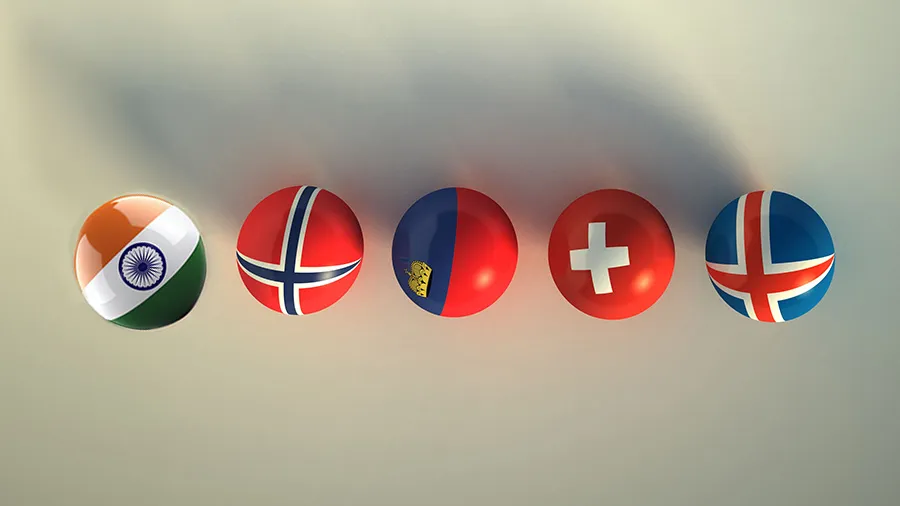
India and EFTA members are looking for the proposed TEPA, as Delhi pushes for $100b investment
NEW DELHI : Negotiations between India and the European Free Trade Association (EFTA) for a trade deal are at an advanced stage, with the two sides hoping to finalise the agreement with a commitment to invest up to $100 billion before the Indian side goes to the polls, people familiar with the matter have said.
The members of EFTA – Iceland, Liechtenstein, Norway and Switzerland – are looking to ensure further progress on the proposed Trade and Economic Partnership Agreement (TEPA) on the margins of the Raisina Dialogue this week, which will be attended by senior officials of at least three of these countries, the people said on condition of anonymity.
The two sides are ironing out issues so that the deal can be signed soon, a senior official with direct knowledge of the matter said. A second official said prospects for an early conclusion had brightened after the 21st round of negotiations in New Delhi during January 8-13.
The EFTA members, especially Switzerland, have eased their position on the key issue of intellectual property rights (IPR). The people said the Indian side has sought the inclusion of a commitment that EFTA members will jointly invest up to $100 billion in the Indian economy over 15 years – a condition that has not been part of any free trade agreements (FTAs) signed recently by New Delhi.
“After the 21st round of talks, differences on various issues have narrowed. Keeping the sensitivities of both sides in mind, a trade agreement could be concluded at the earliest,” the second official said. “Largely, the pact needs political blessings,” he added.
The two sides have also in-principle resolved issues pertaining to key chapters of the TEPA – trade in goods and services, investment promotion and cooperation, rules of origin, IPR, customs and trade facilitation, and trade and sustainable development, the people said.
Referring to the Indian stipulation for a commitment to invest up to $100 billion, the people said EFTA members had conveyed their willingness to look into it provided it is non-binding. The EFTA members had pointed out that while the governments of the four countries can push India as an investment destination, they cannot direct actual investments by private firms, the people added.
“There is a feeling that if the Indian side secures such a commitment on investments for the first time in an FTA, it can be used in ongoing negotiations for other FTAs,” a third person said.
According to the first official, India rejected EFTA’s proposal for including data exclusivity in the IPR chapter as it would have impacted the Indian pharmaceutical industry, mostly generic drug manufacturers. “That issue is not part of the FTA negotiations,” he said.
“India won’t go beyond what is committed under the TRIPS Agreement,” the second official said, referring to the World Trade Organisation’s pact on Trade-Related Aspects of Intellectual Property Rights (TRIPS).
The people said the EFTA circulated a draft of the FTA that proposed making “data exclusivity” part of the IPR chapter, but this was rejected such a clause would have enforced a stricter patent regime – something pushed by global pharma giants – and would restrict Indian pharmaceutical firms from making cheaper medicines.
Though there is no deadline for the TEPA, both sides want to conclude negotiations so that the FTA can be signed before India enters its election cycle, the people said.
Before the talks in New Delhi last month, the two sides held a meeting in Geneva during November 20-29. The talks got further impetus after a high-level meeting between Commerce Minister Shri Piyush Goyal and an EFTA delegation led by Swiss State Secretary Helene Budliger and Norwegian Trade Minister Christine Vestre in December. The visiting officials also met Union Finance Minister Smt Nirmala Sitharaman to discuss the trade deal.
India’s total trade with EFTA during 2021-22 was worth $27.23 billion, with a deficit of more than $23.7 billion. Switzerland accounted for most of the two-way trade with the grouping comprising states that aren’t members of the European Union. The people said a comprehensive deal will be a win-win for both as EFTA can rely on India for friendshoring and New Delhi will be able to increase its exports to achieve an even balance of trade.
India’s key imports from these countries are gold ($20.7 billion in 2021-22), coal, pharmaceuticals, vegetable oil, silver, dairy machinery, medical, crude and scientific equipment. It exports chemicals, iron and steel, gold, precious stones, yarns, sports goods, glassware and bulk drugs to these nations.

